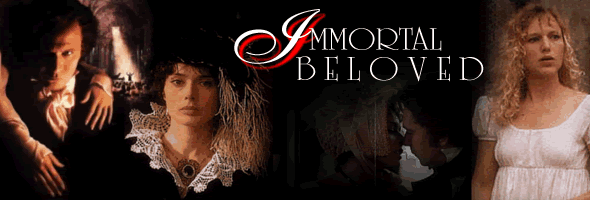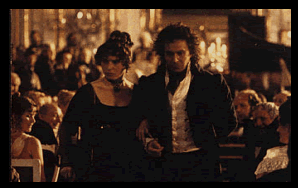
Color, 1994, 120 mins. Written and Directed by Bernard Rose
Starring Gary Oldman, Jeroen Krabbe, Isabella Rossellini, Johanna ter Steege, Marco Hofschneider, Valeria Golino, Barry Humphries, Miriam Margolyes / Cinematography by Peter Suschitzky / Produced by Bruce Davey
Format: DVD - Columbia (MSRP $29.95)
Letterboxed (2.35:1) / Dolby Digital 5.1
At the beginning of the film, Ludwig van Beethoven is dead. Following his funeral, Beethoven's friend, Anton Schindler (the excellent Jeroen Krabbe), uncovers the composer's final will and testament, scrawled on his deathbed, in which he leaves all of his property to "my immortal beloved." Enclosed is a note from years earlier in which he pleads to his anonymous love to wait for him at their rendezvous point. Who was this mysterious woman? Schindler begins questioning Beethoven's acquaintances and uncovers a number of women in the maestro's life, including the mature and dedicated Anna (Isabella Rossellini), the sensualist Giulietta (Valeria Golino), and Beethoven's ultimate nemesis, his sister-in-law, Johanna (The Vanishing's Johanna ter Steege). Along the way Schlinder also learns of Beethoven's stormy relationship with his nephew, Karl (Europa Europa's Marco Hofschneider), and the gradual process by which the composer's escalating deafness became known to the public.
As Beethoven, there could not have been a better choice than Gary Oldman. While no home viewing can fully recapture the experience of this film on the big screen, Columbia's DVD comes much closer than their earlier laserdisc. The laser presentation was marred by Sony's irritating "video improvement" process, which simply slapped a bright yellow tint over the entire movie (see Wolf for another glaring example). The new anamorphic transfer looks much closer to the theatrical prints, with an exquisite level of detail and no visible artifacts. Surprisingly, Columbia has actually decked out this DVD as a full blown special edition and is one of their most lavish efforts to date. Rose provides a full running feature commentary, in which he covers everything from historical minutae to the creation of the decor. Also included is the original ten minute "making of" featurette, basically a standard studio promo piece with cast members talking about their roles -- though it does contain the odd experience of Gary Oldman speaking in his normal thick British accent while in his Beethoven costumes. More interestingly, the DVD contains a new half hour documentary, Beloved Beethoven, featuring on camera interviews with Oldman, ter Steege, Golino, proudcer Bruce Davey, and Rose. The director seems to have been humbled quite a bit in the last five years, perhaps due to the failure of his sumptuous but flawed adaptation of Anna Karenina, but hopefully he will return to form behind the camera in the near future. Rossellini's absence here is regrettable, but everyone else offers some intriguing reflections on the experience of making the film and its reception in years since. The original U.S. trailer rounds out this satisfying package.
Along with David Fincher, British director Bernard Rose is one of the few genuinely gifted visionaries to enter feature films after dabbling in the world of music videos. Rather than simply using fancy stylistics to gloss over a shaky grasp of narrative (as is so often the case), Rose used his visual and editing skills to produce two striking horror films, Candyman and Paperhouse. For his next project, the logical choice was... the story of Ludwig van Beethoven. Immortal Beloved combines the dramatic formalism of Amadeus with the sensory avalanche of Ken Russell's composer biopics (The Music Lovers, Mahler, Lisztomania, etc.) to produce an extremely engrossing and ultimately wrenching historical fantasy, crammed to the corners with visual delights and astonishing directorial flourishes.
 A genuine actor's showcase, the role requires tenderness, anguish, fury, and even insanity, all of which find Oldman well up to the task. The three beautiful female leads all make a vivid impression, with Rossellini and ter Steege especially grapping with difficult, multi-layered portrayals. And then, of course, there is the music itself; conducted by Georg Solti and featuring such modern masters as Yo-Yo Ma and Emanuel Ax, this soundtrack makes Beethoven sound better than ever. However, the imagery is no less impressive; from the breathtaking beauty of the funeral opening to the powerhouse "Ode to Joy" sequence (one of the unsung high points of 1990s cinema), Immortal Beloved manages to constantly pull one ornate surprise after another from its seemingly endless pockets. For some reason, Beethoven scholars took issue with the film's resolution, forgetting the fact that (a) this is not a strictly realistic film, and (b) no one will ever know the identity and the entire circumstances of Beethoven's "immortal beloved." The woman in question may or may not have been in prison depending upon when the original letter was written; however, attacking this film for making conjectures based on a romantic notion is as valid as tearing into Amadeus because no one really knows what Mozart and Salieri taked about on the former's deathbed. Unfortunately, the scholars' jibes were enough to prevent this film from quite achieving the wide release and acclaim it deserved, not to mention several well-deserved Oscar nominations that sadly were not meant to be.
A genuine actor's showcase, the role requires tenderness, anguish, fury, and even insanity, all of which find Oldman well up to the task. The three beautiful female leads all make a vivid impression, with Rossellini and ter Steege especially grapping with difficult, multi-layered portrayals. And then, of course, there is the music itself; conducted by Georg Solti and featuring such modern masters as Yo-Yo Ma and Emanuel Ax, this soundtrack makes Beethoven sound better than ever. However, the imagery is no less impressive; from the breathtaking beauty of the funeral opening to the powerhouse "Ode to Joy" sequence (one of the unsung high points of 1990s cinema), Immortal Beloved manages to constantly pull one ornate surprise after another from its seemingly endless pockets. For some reason, Beethoven scholars took issue with the film's resolution, forgetting the fact that (a) this is not a strictly realistic film, and (b) no one will ever know the identity and the entire circumstances of Beethoven's "immortal beloved." The woman in question may or may not have been in prison depending upon when the original letter was written; however, attacking this film for making conjectures based on a romantic notion is as valid as tearing into Amadeus because no one really knows what Mozart and Salieri taked about on the former's deathbed. Unfortunately, the scholars' jibes were enough to prevent this film from quite achieving the wide release and acclaim it deserved, not to mention several well-deserved Oscar nominations that sadly were not meant to be.
